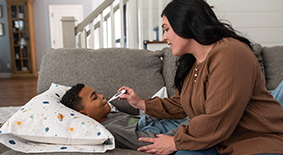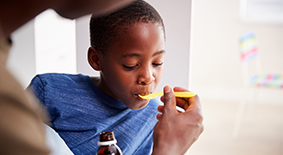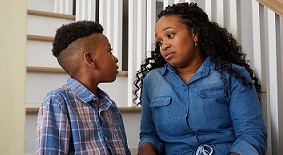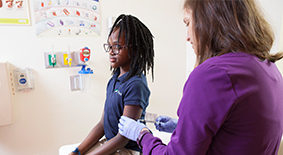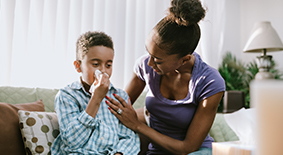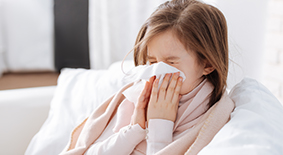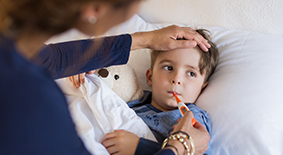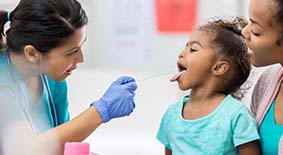How to Comfort Sick Kids at Home
Updated 11/16/22
When you get a cold or other mild illness, you might find relief in a cup of hot tea, some vitamin C and a Netflix binge. But when your baby is under the weather, it can be challenging to know exactly how to comfort him, especially if he’s too young to tell you how he feels. Here are some tips to help you navigate cold and flu season and make the right choices to soothe common symptoms, like fever, cough and sore throat.
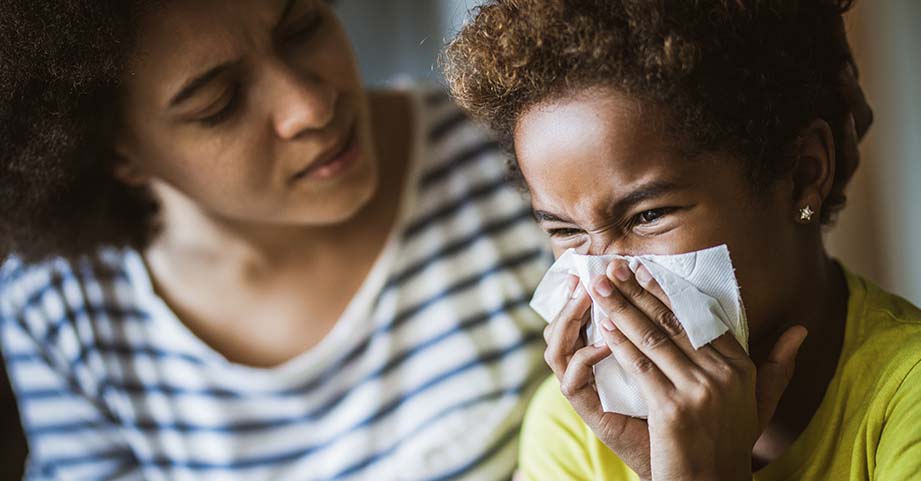
A fever is a sign that your child’s body is fighting off an infection and working to get well. It’s actually a positive sign that your child’s immune system is doing its job. Unless fever is making your child fussy or uncomfortable, you may not need to do anything more than observe her and keep an eye out for other symptoms — rash, diarrhea, vomiting — that signal it’s time for a trip to the pediatrician. Here are some ways to help keep fever in check:
- Draw a lukewarm bath. A lukewarm bath may help bring the fever down without fever-reducing medications. For little ones who are too small to sit in a tub, dip washcloths in lukewarm water, wring out any excess water, and apply it to your child’s chest, tummy, neck and underarms. Remove or change the washcloths as soon as they start to cool off, repeating the process for no longer than 20 minutes. Dry your baby and keep her covered with a light blanket.
- Give fever-reducing medicine. If your child seems to be in pain or uncomfortable, you can give her acetaminophen or ibuprofen to lower her fever, but avoid giving aspirin, as this can cause a dangerous disorder called Reye’s syndrome. Be sure to follow the instructions on the label and measure carefully based on your child’s weight, not her age. If your little one is younger than 2 years old, call your pediatrician before giving her any medication.
- Encourage fluids and rest. Kids can become dehydrated when they have a fever, so be sure to offer lots of fluids throughout the day. Also important: sleep. This is the best medicine to help your child heal and fight off infection.
If a fever lasts longer than 24 hours in kids younger than 2, or longer than 72 hours in kids older than 2, call your child’s pediatrician.
Symptoms of a sore throat may include a painful throat, fever, swollen glands in the neck, bad breath, scratchiness in the throat and redness in the back of the mouth. Over-the-counter medications like acetaminophen or ibuprofen can be used to help control the pain of a sore throat. Cough medicine, on the other hand, should not be given to kids under age 6. Try these alternative ways to help keep your child comfortable:
- Sleep at an incline. Parents know how awful a persistent cough or sore throat can be, especially during the night. Many times, nighttime coughing can be caused by postnasal drip or drainage. Sleeping slightly inclined can help older kids and teens. For older children, this can be accomplished with an extra pillow. Infants, however, should be on their backs, flat and without anything in their crib, until 12 months of age in order for them to sleep safely.
- Keep cold liquids at the bedside. As with any illness, staying hydrated is important. Liquids can also help ease some symptoms, like a sore throat. For older kids or toddlers, consider putting a non-spill sippy cup of ice water at their bedside to help ease middle-of-the-night coughing.
- Take some honey. According to the Centers for Disease Control and Prevention (CDC), honey can help relieve a sore throat or coughing. The CDC suggests mixing 2 tablespoons of honey with a warm glass of water or tea and drinking as needed. Honey can also be taken by itself, without mixing in a liquid, to calm a cough. For children older than 1 year, you can give 1 teaspoon of honey. For older children (teens and young adults), you can go up to 1 tablespoon. This remedy is also helpful if the sore throat is accompanied by a cough.
Important note: Honey should not be given to infants under 1 year old. It can carry bacteria, such as Clostridium botulinum, that can be especially dangerous for babies.
Stuffy and runny noses are common cold symptoms that frequently affect little ones throughout the year. Here are some helpful ways to keep your child breathing easy:
- Try saline and a syringe. Keeping the nasal passages clear can help kids and babies sleep more soundly and feel better. If your baby is too young to blow her nose, use a saline spray and a syringe or nasal aspirator to get mucus out of her nose.
- Use a cold vapor humidifier. Humidifiers can be a great way to add moisture to air passages and help relieve stuffy noses. Make sure you follow the directions on the humidifier label and clean it as directed. Cold vapor humidifiers are a great addition to your list of at-home remedies.
If your child is sick, she may not have the same appetite that she typically does. “Parents are often worried when their child is not eating as much as usual while they are sick, but this is very common,” says Deirdre Stewart, MD, an area practice director for Children’s Healthcare of Atlanta Urgent Care. “I recommend providing nutritious snacks that may be readily available throughout the day, without the expectation of feeding your child a full meal until they are healthy again. Also, it is important to encourage them to drink fluids often to make sure they don’t become dehydrated. This is especially important if they have fever.”
Now more than ever, it’s really important to keep sick kids at home if possible. COVID-19 is obviously a big concern, but other illnesses like flu can also be problematic for young children. “When your child is suffering with a mild viral infection or mild symptoms, it’s best to care for her at home,” says Dr. Stewart. “Keeping your child protected from outside germs can often be better than taking a trip to the pediatrician or sending her to school and daycare, where she may be exposed to other sick children.”
We know you want to do everything you can to help make sure your children are happy and healthy. Sometimes all kids need is a little time and some extra TLC to get over an illness. But if these at-home remedies don’t seem to be enough, or if you have any concerns about your child’s health or well-being, trust your gut and contact your pediatrician.

Where you take them matters
Sometimes your child needs access to care on weekends and holidays too. Our Urgent Care Center physicians are here for you—plus, they’re specially trained to diagnose and treat children’s and teens’ common illnesses and injuries.
See MoreHelping Your Kids Stay Healthy and Safe
Deirdre Stewart, MD, is an area practice director for Children’s Healthcare of Atlanta Urgent Care. She has been working in Urgent Care at Children’s since November 1999. Dr. Stewart maintains an undergraduate degree from Emory University, Medical School at Medical College of Georgia, and pediatric residency at Emory. She is board certified in PediAttica and a member of the AAP and Society for Pediatric Urgent Care.
This content is general information and is not specific medical advice. Always consult with a doctor or healthcare provider if you have any questions or concerns about the health of a child. In case of an urgent concern or emergency, call 911 or go to the nearest emergency department right away. Some physicians and affiliated healthcare professionals on the Children’s Healthcare of Atlanta team are independent providers and are not our employees.
Contact Us 404-785-KIDS (5437)

